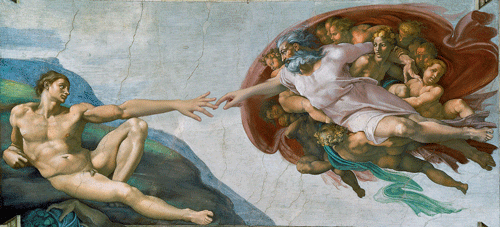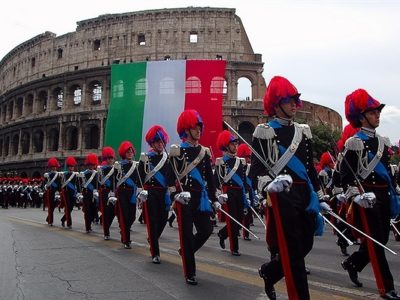Have you ever asked yourself why Italians make hand gestures while talking? Or why they consider Olive Garden as an insult? Based on movies like The Godfather, the media depicts Italians as very expressive people. These portrayals include the phrases “ma che cosa dici?” or “Mamma mia!“ along with the classic hand gesture. If you want to discover the reason for the most common stereotypes towards Italians, or if you just like pasta, cannolis and fashion brands such as Gucci, then the Italian major might suit you. With around 66 million speakers in Italy and overseas, Italian may belong to the club of most underrated Romance languages. Nevertheless, this should not prevent learners from immersing themselves in this beautiful language. Siete pronti? Andiamo! Are you all ready? Let’s go!
Read on to learn what an Italian major provides and what makes the Italian major so cool.
Quali lezioni frequenterai? Which classes will you attend?
1. Elementary and Intermediate Italian

Before you shock yourself, Italian students do not just read, write and listen to Italian all the time. Studying a language’s grammatical rules is important for sure. However, learning a language involves way more than just memorizing rules but includes practicing communicative discourses and pronunciation as well. An old Italian proverb says “chi va piano va sano e va lontano,” or “slow and steady wins the race.” In other words, Italian demands practice like any other language. Practice makes perfect, and these Elementary and Intermediate Italian classes shall guide you. Here, Italian teachers engage with students by talking in Italian for the duration of the class. “I have always liked Italian, so I did not overlook the opportunity of taking it when I had the chance,” Montgomery College student Maria Jose Reto said. “Even though I had some difficulties, I always wanted to learn because my instructor was so nice and made the class really interesting!” In addition, teachers combine videos with in-class individual and group activities for students to talk in Italian with their classmates.
2. Cuisine, Culture and Society in Italy (Yesterday and Today)

For pasta and fashion lovers, here comes the fun part. Rather than focusing on the language, the course’s goals aim at people interested in Italian not as a language but focusing on the country in which the language comes from. Taught and discussed in Italian, students learn how people live in Italy. Specifically, their distinctive ways of life compared to that in the United States. In addition, students learn about Italian holidays such as la Festa della Reppubblica, which commemorates the day Italy became a republic in 1946, la Festa de la Liberazione, celebrating the end of Nazi Germany occupation in Italian territory, and Ferragosto, where every store and restaurant closes for summer!
3. Review of Italian Grammar

Do not let the word “review” misguide you. The course’s goals differ from Intermediate and Elementary Italian. Here, the course’s goals shift to a more academic approach. The professors intensively go through the major aspects of contemporary Italian grammar and writing composition. Some of the tasks that instructors demand from their students include one-page Italian essays and in-class exhaustive readings to show your domination of the Italian language. “I thought the class was a good refresher for a lot of Italian grammar, but for a first time Italian student it could have been better so the information had a deeper understanding, instead of just rushing through each topic,” University of Maryland student Matt Killian said. “The professor knew her subject very well, but I felt that she taught every lesson in the same way, so that hindered our comprehension of more complex topics.” Students who mastered the language will not face problems, for the course will polish the knowledge obtained in Elementary/Intermediate Italian.
4. Advanced Oral Expressions

Journalism and mass communication majors, this is your lucky day. The Italian major also offers a look at the development of idiomatic expressions and forms in terms of Italian media. Instructors teach the class with more emphasis on discussing events in Italian society, as well as social, political or economic issues surrounding Italy. In terms of the language itself, instructors expect a total understanding of Italian from their students. Since the instructors provide only Italian readings and texts, the topics discussed demand a lot of reading comprehension.
5. The Faces of Evil in Dante’s Inferno

If Dante knew about courses dedicated to him and his “La Divina Commedia,” he would feel proud. Dante Alighieri’s “Divine Comedy” for Italians compares to William Shakespeare for English speakers or Miguel de Cervantes for Spanish people. The predominant work of Italian and world literature deserves a course only dedicated to a narrative poem that took 12 years to complete. In terms of the course, it specifically analyses Dante’s depiction of monsters and demons in his vision of hell. Due to the poem’s worldwide recognition, instructors carry on the class in English.
Studiare all’estero or study abroad

Students declaring an Italian major participate in multiple events, culturally and linguistically in Italy. For this reason, some of the study abroad programs available include taking credits according to your major or field of interest. For instance, the Scuola di Amministrazione Aziendale at the University of Torino provides marketing and business majors the option to take classes equivalent to U.S. credits, with instructors in both English and Italian. Meanwhile, students who pursue an education career can volunteer outside class and teach English as a second language in elementary schools. “Since I am an archaeology major, I studied ancient sculptures and mosaics at museums in Naples and Rome,” Montgomery College alum Sebastian Vinueza said. “Something I would like to highlight is my time in Pompeii, where professional archaeologists restore the corpses from people and animals who died in the ashes when the Vesuvius erupted. In Florence, I got the chance to learn Renaissance art like the famous David sculpture and Raphael’s paintings.” Overall, the major itself targets those who specifically seek a teaching career in education. Therefore, dozens of opportunities include working as museum guides, translators and other careers that involve self-disclosure in Italian. Good luck, or In bocca al lupo!
Opportunità di lavoro or employment opportunities
1. Teacher

As mentioned before, students who enroll in majors related to foreign languages typically pursue a career in education. Teaching a second language may seem like a challenge at first. However, it benefits both the student and the instructor. While the instructor refreshes the skills they acquired by sharing their expertise with the students, the students, in turn, develop the knowledge they need for proficiency. Besides taking courses on your language of interest, the requirements for working as a foreign language teacher include completing a test for educators, earning a bachelor’s degree with a teacher preparation program and applying for teacher certification.
2. Translator

Becoming a translator demands knowledge in not just one foreign language, but two or more. Good translators must be compliant, committed to their work and trustworthy. Professional translators do not just decipher sentences and words, but legal documents where every sentence matters. In other words, if you apply to a translator job, make sure to translate as accurately as possible. Consider also time management, since some organizations work with deadlines for their translations.
3. Foreign diplomat

This job calls your name, international relations majors. Employments in foreign diplomacy demand great expertise in topics like politics, history and international law. For example, students who pursue a diplomat employment in Italy representing the United States ought to know about Italian history, politics and most importantly, scrutinize the Italy-U.S. relationship. In addition, foreign diplomats participate in cross-cultural events at embassies, such as the Fourth of July in the U.S embassy in Italy or the festa della reppubblica in the Italian embassy in Washington D.C. Some of the required skills include dedication, expertise in laws and policies and above all, a C1-C2 level of proficiency in the foreign language of interest. Regarding the examination process, all foreign diplomacy pursuers must pass the Foreign Service Officer Test (FSOT).
4. Journalist

Based on what most people see often on the TV, journalists’ work includes heavy travel around the world for reporting. Although most journalism majors do not expect to learn a foreign language for future jobs, most news enterprises such as the BBC or CNN prefer multilingual reporters for their staff. This helps reporters to communicate with their interviewees who may not know English. Other types of journalism which include blogs and other digital platforms also prefer multilingual posters for reaching a wider audience. In Italy, Italians rely on the three major media and broadcast news outlets, Radiotelevisione Italiana (RAI), Mediaset and Sky Italia. Since Sky Italia belongs to the British television news channel, Sky News, the staff should have proficiency in both Italian and English.
5. Tour Guide

To host tourists in your own homeland surely makes anyone proud. Showing landscapes, places, people and costumes to guests in your own country allows tourists to know more about your homeland. However, those stories will surely impact visitors differently if the tour guide self-discloses in the tourists’ mother tongue! Answering in Italian to a group of Italian tourists or speaking English to American/British tourists will make them appreciate the connection you try to establish with them. Speaking to guests in their native language creates a bridge between the host nation and members from the visiting nation. The most resilient characteristics of a tour guide include enthusiast approaches to tourists, punctuality, and responsibility for successfully following safety guidelines.



















